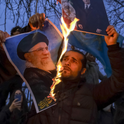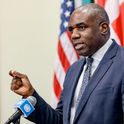Even before the US president went on his tour of Gulf Arab states last week, it was clear that Washington was going to engage with the Arab world in a rather different fashion to the first Trump administration—or any other US administration for that matter.
As observers tried to decipher what Trump’s new approach might be, and how governments in the region would respond, one question kept recurring. Had Israel, Washington DC’s closest ally in the Middle East, been sidelined?
A lot happened last week, all of it well aligned with Trump’s doctrine of “America First”. Applied to international affairs, the president’s transactional approach meant that economic agreements were foremost on the agenda. In that regard, there were win-win arrangements aplenty. In Saudi Arabia, for instance, Trump secured a $600bn investment deal, including the largest US defence agreement to date. The Qataris, meanwhile, pledged to purchase up to 210 Boeing jets, the largest order in this US company’s history, along with promising $10bn to upgrade the US military base near Doha. (The Qataris may also be delivering an older Boeing jet to the US as a gift to replace Air Force One; this was a story in and of itself, as it seems Doha may have been offloading a plane that it isn't possible to sell.) And in the UAE, there was a preliminary agreement to import 500,000 artificial intelligence chips annually from Nvidia, an American firm, aligning with Abu Dhabi’s ambition to be an AI hub.
These negotiations were an obvious expression of “America First”, in that they clearly framed US interests chiefly in economic terms. But there were political repercussions, too. Capitals in the region have successfully cultivated deep relationships with Trump, particularly Ankara and Riyadh. The most crucial outcomes of this process was last week’s declaration that the US would lift sanctions on Syria, a decision which followed Trump’s meeting with the country’s interim president, Ahmed al-Sharaa, in Riyadh (most of those sanctions had frankly lost all legitimacy anyway, as they were originally intended to pressure the Assad regime, which fell in December).
Not that the removal of Syria’s sanctions was totally out of step with Maga Republicans. After all, as some Syrian advocates argued, the move was a way for the US to keep Russian, Chinese and Iranian influence in Syria at bay, which matches what some in the Maga movement have been calling for at home. But it also opens up the possibility for future transactions with Syria’s authorities. Moreover, for months, Riyadh and Ankara lobbied Washington to remove the sanctions. Trump seems to have decided that lifting them would be better for American interests than leaving them in place. There are certainly more opportunities for US businesses without these restrictions on Syria’s economy, but lifting them also strengthens ties with Turkey and Saudi Arabia, two key regional players for Trump.
And while the US president was busy making deals across the Gulf, the Israelis were completely bypassed on the trip. Trump met with the leaders of Saudi Arabia, Qatar and the UAE, but not with Israel’s prime minister, Benjamin Netanyahu. Meeting al-Sharaa, whom Israeli officials have denounced as a terrorist jihadi, was another twist of the knife. Trump even flattered Syria’s leader, calling him “young, attractive. A fighter”.
Israel wasn’t simply bypassed, however—it was overridden on multiple issues, before and during the visit. Trump lifting of Syria’s sanctions, for instance, revealed his growing distance from Netanyahu in two ways. The first was indirect; Trump openly talked about how Turkey’s President Erdoğan, a vigorous critic of Netanyahu and Israel, had lobbied him on this point. The second was more poignant: Trump declared the lifting of sanctions even though Israel had lobbied Washington for months against such a move.
Elsewhere, there is more evidence that Netanyahu’s fortunes in Washington have taken a downturn. Trump’s dismissal of Mike Waltz as his national security advisor is being reported in the Israeli press as a case in point. It reportedly happened due to Waltz’s engagement with Netanyahu—something that seems to have angered Trump. Here’s another example: Trump authorised a ceasefire between the US and the Houthis in Yemen without including Israel, which continues to be targeted by Houthi missiles. Perhaps most striking of all, Washington is drawing closer to a nuclear deal with Iran. This comes despite Israeli efforts to lobby against such an agreement—and Netanyahu’s years-long obsession with the Iranian threat. On his Gulf trip, Trump declared that he had “sort of” agreed to terms of a deal with Tehran.
If this was not sufficient evident of the daylight between Trump and Netanyahu, the president made something else very clear. Normalisation of relations between Israel and its neighbours is no longer a condition of deepening engagement between Washington and Arab capitals. The deals between Saudi Arabia and the US, including on energy, were wholly bilateral. They did not take into account the prospect of Saudi-Israel normalisation, which the US has pushed for so long.
Instead, Riyadh stuck to reiterating that Palestinian statehood is a precondition for normalising with Israel—a demand that, while eminently reasonable, is off the table for Netanyahu. Netanyahu’s—and Israel’s—standing in the region and worldwide is at rock-bottom because of its war on Gaza. Israel’s assault has led to charges of war crimes for Netanyahu at the International Criminal Court and accusations of genocide at the International Court of Justice. As far as Saudi Arabia is concerned, normalisation doesn’t make sense now. Washington has finally recognised this. Even when Trump mentioned the Abraham Accords (the normalisation agreements with Arab states that Trump pursued in his first term) to Syria’s al-Sharaa, he did so after declaring that Syria’s sanctions would be lifted. This was a clear sign that Trump was not prioritising Israeli normalisation. In any case, Syria is unlikely to proceed on that path, especially while Israel continues to occupy large parts of its territory.
Amid these geopolitics, Trump might be expected to change his policy on Gaza, especially given the extraordinary suffering of Palestinians there. Last week, the United Nations chief official for humanitarian affairs, former British ambassador Tom Fletcher, urged the UN Security Council (UNSC) to act in order to “prevent genocide” in Gaza. Many prominent international organisations, such as Amnesty International and Human Rights Watch, have concluded that a genocide is already taking place. Meanwhile countries across the world, ranging from Spain to Malaysia to Egypt, have come to the same conclusion. Josep Borrell, the former EU high representative for foreign affairs and security policy, also accused Israel of genocide in a speech earlier this month. Whether one agrees with these conclusions or not, it is clear that the situation in the Strip is severe, and that more and more of the international community can see it.
Despite Trump’s seeming abandonment of a staunch US ally, however, there is little to indicate that there will be a sea-change in America's policy on Israel. Trump’s special envoy to the Middle East, Steve Witkoff, made it very clear on the Gulf trip that the US will not use its considerable leverage (which includes access to arms supplies and political support at the UNSC) to force a substantial change in Israel’s behaviour.
In this regard, the US is just as supportive of Israel today as it was under Joe Biden, and even more so. The arguments for stopping Israel's actions in Gaza would be moral or based on long-term security. But there’s no “America First” transactional, economic argument for doubling down on efforts to stop the war in the Strip. Against deep opposition to curtailing Israeli action within the Republican party, it’s unlikely Trump will move for any harsh measures to curb the Netanyahu government’s worst instincts.
It could be that Trump is invested, perhaps even ideologically, in the opposite direction. It is worth remembering that, during his first administration, Trump moved the American embassy to Jerusalem and recognised Israeli sovereignty over the occupied Golan Heights. Following his Gulf trip, Trump publicly rejected the idea that he is frustrated with Netanyahu. Indeed, there has been speculation that the US could move to recognise Israel sovereignty over parts of the occupied West Bank.
For now, when it comes to the Middle East the pragmatists in Maga have won out over the ideologues on a few matters, not least Trump’s clear preference for a deal with Iran. As long as the ideologues remain sidelined, America First transactionalism may provide further dividends. For Israel, however, over time Maga could well lead to a very different security paradigm. It is highly unlikely that Israel will manage to evade a substantial portion of Trump’s base seeing it as drain on US resources.
Still, this is unlikely to lead to a massive set of policy changes on Israel. Yes, Trump left Netanyahu on the sidelines when he was in the Gulf. But a true shift on Israel would require consistent and substantial work, even if the will was there, to change the edifice of policies that have been decades in the making. Trump may have a penchant for moving fast, but the policy machinery in Washington moves slowly, even at the best of times.












